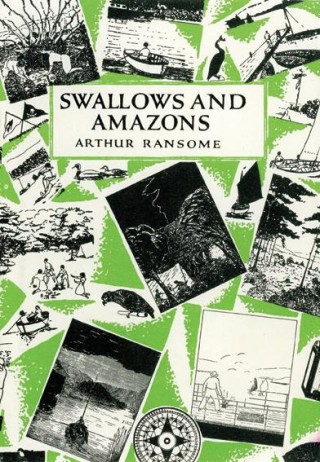June 29, 2015
New TV adaptation of classic children’s book to be less salacious than its source material
by Mark Krotov
 The Swallows and Amazons series is a classic of British children’s literature. Between 1930 and 1947, Arthur Ransome published twelve books in the series, which followed groups of children on holiday in various exotic locations like the Lake District, which qualifies as exotic because, as far as I know, it is the only district in the United Kingdom to feature lakes.
The Swallows and Amazons series is a classic of British children’s literature. Between 1930 and 1947, Arthur Ransome published twelve books in the series, which followed groups of children on holiday in various exotic locations like the Lake District, which qualifies as exotic because, as far as I know, it is the only district in the United Kingdom to feature lakes.
The titular book (you’ll see in a moment why I should be murdered for using that adjective), the first in the series, has been adapted for film and television a number of times since its publication, and the BBC is currently filming the newest version. Swallows and Amazons follows two groups of children: the Blacketts and the Walkers. The Walker children are named John, Susan, Roger, and Titty.
Titty? Yes, Titty.
Readers of MobyLives are a sophisticated group, and surely not ones to snicker and giggle at this kind of thing. But as there is probably not much overlap between MobyLives readers and the viewers of a children’s movie, you can understand why the BBC has chosen to change “Titty” to “Tatty.”
Children are very wise, of course (they even run for president!), but how could any child—no matter how enlightened—fail to laugh at a character named “Titty”? Best not to pull the audience out of a scene. Indeed, there is precedent for this name change: a 1963 TV adaptation changed “Titty” to “Kitty.” Which, again, seems pretty reasonable.
And yet here is how the Independent began its article on this news:
The BBC has bowed to (presumed?) pressure from the PC lobby and changed the name of one of the “Swallows” in a new adaptation of Swallows and Amazons to prevent titters.
Never mind the “titters” at the end (I, too, fell victim to such immaturity only a few paragraphs earlier)—it’s the first sentence I’d like to examine a little more closely.
The article’s author seems to acknowledge that referring to the impact of a wholly ethereal “PC lobby” may not be journalistically rigorous, because there is absolutely no basis for such an assertion. So she includes the word “presumed,” followed by a question mark, which is meant to . . . well, I’m not sure what it’s meant to do, but it undercuts her argument pretty dramatically. Imagine if a “(presumed?)” began to appear in front of every unproven assertion: it would make right-wing blogs way less fun to read, for one thing. (“The (presumed?) Muslim, (presumed?) Kenyan-born (presumed?) socialist president of the United States, Barack Hussein Obama, has a (presumed?) new plan to destroy America.”)
Fortunately, children looking to eighty-five-year-old books for kicks will continue to be able to do so. As the Guardian reported:
Charlotte Knight, who publishes the book at Vintage Classics, said this morning that she “wouldn’t consider changing Titty’s name because that is what Arthur Ransome called her,” and “at Vintage Children’s Classics we always avoid interfering with the original text.”
Also at the Guardian, Nicholas Tucker, former senior lecturer at the University of Essex, has a great piece with a truly perfect title—“In more innocent days, you could write about cocks and not be misunderstood”—that cites some other instances of mostly unintentional double entendres. My favorite is this line from an 1891 Sherlock Holmes story: “a sudden ejaculation caused me to wake up.”
At the end of Tucker’s piece, which is well worth reading, he suggests that deliberate double entendres, like the 1998 Winnie the Pooh book Pooh Gets Stuck, are far less entertaining than the unintentional ones. Having spent the last few weeks staring with disgust at posters for Ted 2, to which I link with great hesitation, I couldn’t agree more.
Mark Krotov is senior editor at Melville House.